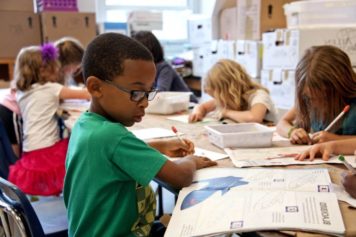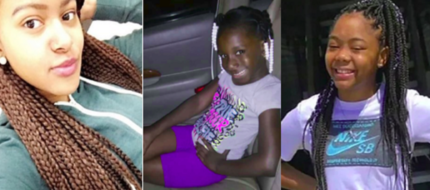Kimberle Williams Crenshaw, the author behind the “Black Girls Matter” study, always knew young girls who didn’t complete school were typically faced with poor life outcomes, but she needed to dig deeper.
So the researcher launched a series of candid conversations with formerly incarcerated women and current students that revealed just how detrimental the school-to-prison pipeline is for Black girls.
“’Black Girls Matter’ provides one very discreet snapshot of the conditions that confront some Black girls and other girls of color in two of our nation’s school districts,” Crenshaw told NPR. “It draws attention to ways that school policies and other factors contribute to the tenuous relationship that these young women had at school, and it elevates the racial disparities Black girls face relative to white girls when it comes to punishment.”
It was only about a week ago that Crenshaw’s report, “Black Girls Matter: Pushed Out, Overpoliced, and Underprotected,” revealed that the school to prison pipeline was impacting Black girls at a disproportionately higher rate than their Black male counterparts.
The study showed that Black girls are suspended six times more often than white girls while the gap is roughly half that wide between Black boys and white boys.
Crenshaw explained that Black girls are being negatively impacted at exponentially high rates by the same unforgiving zero tolerance policies and excessive security measures that are allegedly being put in place to make school a safer, more welcoming environment.
“Ideally schools should be supportive environments for students,” Crenshaw said. “Unfortunately, zero tolerance policies tend to funnel vulnerable students out of school and into prisons, low-income jobs and poverty. Black girls and other girls of color are susceptible to zero tolerance policies that can dehumanize them and make them feel uncared for.”
Crenshaw said one example of this was the presence of metal detectors and additional security on the school’s campus that most Black girls said were completely ineffective at making them feel safe.
In addition to policies that leave Black girls feeling vulnerable and devalued, racial discrimination in the classroom also proved to be a serious challenge.
When the study’s authors sat down with some of the Black girls who were dealing with these issues on a daily basis, they discovered that most of them were aware of the negative, racist perceptions their teachers had of them.
“Young women we spoke to believed that many of their teachers viewed them negatively as girls who ‘can’t be trusted,’ or girls who are ‘loud’ and ‘rowdy,’ ‘ghetto’ and ‘ignorant,’” Crenshaw added. “Stakeholders also shared their perceptions that the demeanor of Black girls’ was often misinterpreted as defiant or as challenging authority when in fact the girls were simply engaged, curious and expressive.”
For many members of the Black community, those negative perceptions come as no surprise.
There has been a long, noted history of the fact that the presence of “blackness is associated with aggression” and that Black “girls and women are excessively sanctioned for gender-transgressive behavior,” she said.
Young girls also expressed being emotionally hurt by the fact that their achievements were often overlooked while their white counterparts were frequently praised.

Kimberle Williams Crenshaw, author of Black Girls Matter: Pushed Out, Overpoliced and Underprotected
Crenshaw explains that this often encourages young Black girls to seek “other ways of gaining attention and recognition from their peers.”
Once these alternative methods of seeking attention and the frequently physical displays of self-defense against bullies caused Black girls to get suspended or expelled, their future suddenly became extremely bleak.
“Suspension and expulsion are tied to a host of short and long term consequences,” Crenshaw added. “For some students, zero tolerance policies in schools lead directly to involvement in the criminal justice system. Some of the girls in our study, for example, were arrested in connection to school fights. For others, the pathways from school push-out lead to low wage work, economic insecurity, confinement and other hardship.”
As with the original report, Crenshaw made it clear that she is not suggesting that the plights of young Black boys need to be snatched from the spotlight and shunned by national efforts to reform education.
She does, however, believe it’s time for the hardships that young Black girls are facing also be pushed to the forefront of national discussions.
“There is no reason, then, to leave girls out of the conversation about the policies that create pathways to nowhere,” she said. “Most importantly, there is no reason to assume that initiatives designed to disrupt these negative outcomes for boys need not include girls.”


